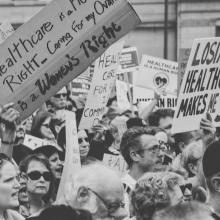access to health care
MY HUSBAND AND I are privileged to have health care for ourselves and our children. While access to health care is a serious and growing concern in our nation, as well as in our own state of Texas, we realize what a privilege it is to afford, even if barely, health care through our respective employers.
Not too long ago my husband was rushed to the emergency room, and later ICU, in a near-diabetic coma. Last year, we were heartbroken over our toddler’s unexplained seizures. It took nearly four months before she was seen by a neurologist and another six weeks to be able to get an MRI. Two more months passed before we could return to the neurologist for results. For more than eight months, we had to wait on an answer, while our faith was stretched thin. When would God show up?
According to The Commonwealth Fund, Texas ranks 49th of the 50 states for worst health care in terms of access, outcomes, and costs. Texas has also opted not to expand Medicaid eligibility, which has had devastating consequences in our communities. Our elders will say that faith is what keeps them alive when the health care system has repeatedly failed them. Younger generations will say we should not have to choose between groceries, child care, and unpaid health care bills. We have been to the pediatrician, therapy, primary care, specialist, emergency room, and ICU more than we would like.
THE LAST TWO years have been extraordinarily difficult for many Christians in the United States who care about social justice and treating the most vulnerable as we would treat Christ himself, given the cruelty of the Trump administration toward the ones that Jesus calls the least of these.
Yet a significant change in our collective imagination is showing signs of emerging out of the 2018 midterm elections and the new public policy debates around health care and climate change, at least in the House of Representatives under new leadership. If realized, this shift could be profoundly important and hopeful for the future of our nation and our planet.
For decades now, we have lacked both the seriousness of purpose and the commitment that we will need to change the status quo on both of these issues, and changing that should be a moral imperative for Christians.
The next few months have the potential to significantly shift the terms of political debate in the United States and even reshape the public’s perception of what our country can achieve on access to affordable health care and efforts to avoid the most catastrophic levels of climate change.
IN MINNESOTA, Alec Smith was unable to afford either health insurance premiums or the insulin needed to treat his Type 1 diabetes, despite working full time. He died last year from diabetic ketoacidosis, at age 26. Other young Americans with diabetes have suffered the same fate.
David Bridges of Indiana has health insurance through his job, but a high deductible means he has to pay for his multiple prescriptions out of pocket. One of those prescriptions alone costs $700 a month. He maxes out credit cards to buy what medicine he can, yet still has to skip doses.
These stories represent the status quo of U.S. health care, even with the preservation of the Affordable Care Act. In responding to such gaps, the faith community has traditionally turned to the direct provision of charity health care, a generous hallmark of our traditions for generations. But we cannot stop there.
Of course Obamacare is failing.
Not quite as badly as No-Obamacare was failing, so I'm still glad it exists. It's a necessary stopgap until we find a system that actually works. But you know what? Single-payer healthcare will fail just as badly.
Yes, I know that single-payer healthcare systems succeed in other developed nations. I also know that competitive insurance-based healthcare systems succeed elsewhere. But neither system will succeed in the United States, because the U.S. is the only nation on earth that refuses to keep healthcare spending from spiraling out of control. If the cost remains the same, it doesn't matter who's paying. In the long run, we all are.



